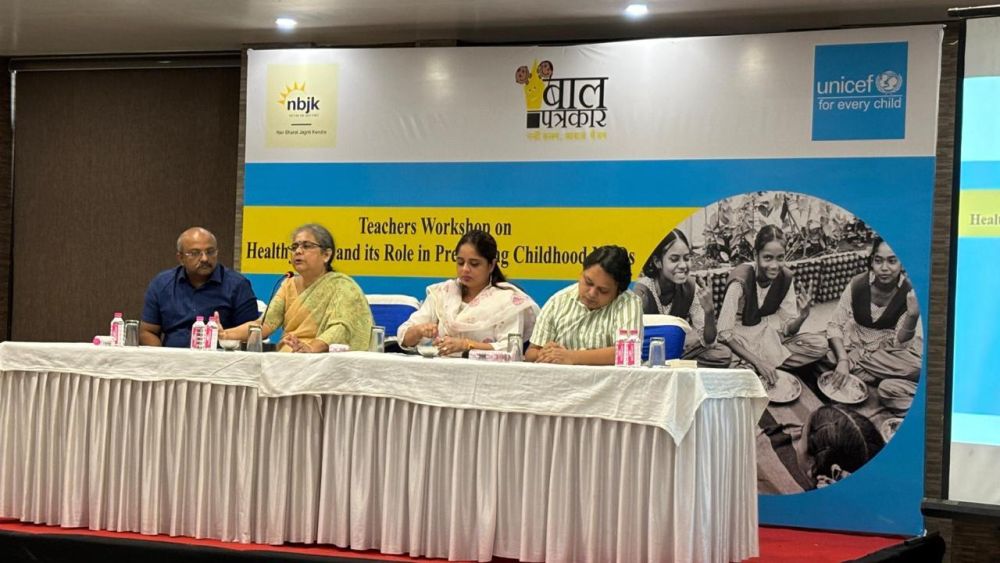
UNICEF Jharkhand, in collaboration with Nav Bharat Jagriti Kendra (NBJK), organized a workshop today to enhance teachers’ awareness and capacity in tackling the rising risks of childhood non-communicable diseases (NCDs) in the state and in promoting healthy diet among children.
The workshop brought together around 80 teachers and principals from 70 government schools across seven blocks of Ranchi, along with BPOs and BEEOs. During the program, Dr. Kaninika Mitra, Ms. Astha Alang, Dr. Vanesh Mathur and Mr.
Pritish Nayak from UNICEF shared their expertise on childhood NCDs, the diseases that can be caused due to obesity and consumption of junk food and the crucial role teachers play in fostering healthy habits among students.
Speaking on the role of teachers in promoting healthy eating habits and preventing childhood NCDs, Dr. Kaninika Mitra, Chief of UNICEF Jharkhand said, "Healthy eating habits are formed during childhood, and teachers serve as the first line of influence in shaping these habits.
Their role extends beyond textbooks and classrooms; they are mentors and guides who contribute to the overall well-being of their students. When children learn about nutrition, physical activity, and balanced eating from their teachers, they are more likely to develop lifelong habits that support a healthier future."
She further emphasized, "Schools are not just centres of academic learning; it is where children absorb values, practices, and behaviours that shape their lives. By integrating discussions on healthy diets and wellness into everyday lessons, teachers can actively help reduce the risk of non-communicable diseases such as obesity, diabetes, and hypertension."
Ms Astha Alang, Communication Specialist at UNICEF Jharkhand, set the tone for the workshop by highlighting the shared responsibility of educators and society in addressing childhood health challenges. She said, “Teachers are the foundation of a child's learning journey, and their influence goes far beyond academics.
This workshop was designed to equip teachers with knowledge about childhood non-communicable diseases (NCDs), their causes, risk factors, and prevention strategies, as well as the role of nutrition and lifestyle in mitigating their impact.
By empowering educators with this information, UNICEF is enabling them to become health advocates in their classrooms and communities. The goal is not just to help teachers recognize the symptoms of NCDs but also to proactively educate students about the importance of healthy living."
Dr. Vanesh Mathur, Health Officer, and Mr. Pritish Nayak, Nutrition Specialist, led technical sessions that provided an in-depth understanding of childhood NCDs. They emphasized the importance of early intervention, lifestyle modifications, and the role of balanced nutrition and physical activity in preventing these diseases.
Additionally, they highlighted the need to identify healthy local food alternatives and develop practical strategies to promote a sustainable culture of healthy eating among school children.
The workshop was highly interactive, providing teachers with opportunities to share their insights, experiences, and challenges in promoting healthy eating habits among students.
Participants discussed practical ways to incorporate health education into school activities and explored how local food options could be leveraged for better nutrition.
Interactive discussions and group activities further enriched the learning experience, enabling teachers to develop actionable strategies to make nutrition education an integral part of their daily teaching.